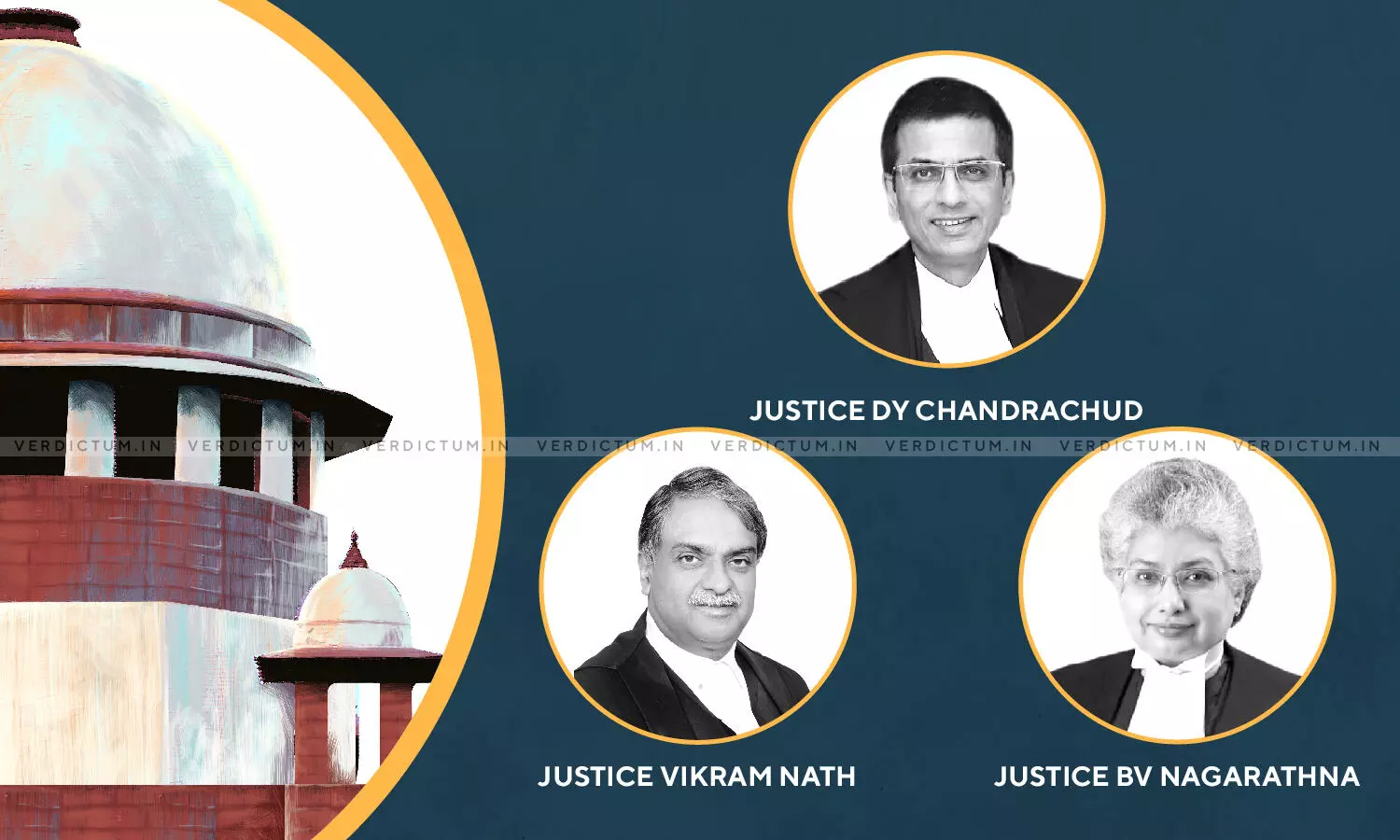
Even If The Order Taking Cognizance Is Irregular, It Would Not Vitiate Proceedings In View Of Section 465 CrPC – Supreme Court
 |
|A three-judge Bench of Justice Dr. DY Chandrachud, Justice Vikram Nath and Justice BV Nagarathna has held that an irregularity in an order taking cognizance would not vitiate the entire criminal proceedings in view of Section 465 CrPC.
Senior Advocate Mr. Siddharth Dave and Senior Advocate Pravin H Parekh appeared for the Appellants-Accused, while Advocate Mr. Nikhil Goel appeared for the Respondent-State of Karnataka during the proceedings before the Court.
Appeals were preferred assailing the judgment of the Karnataka High Court which had dismissed two petitions of the Appellants filed for quashing the criminal proceedings initiated against them. The Appellants were charged under Sections 409 and 429 read with 120B IPC and Sections 21 and 23 read with Sections 4(1) and 4(1)(A) of the Mines and Mineral (Development and Regulation) Act, 1957, and Rule 165 read with Rule 144 of the Karnataka Forest Rules, 1969.
In this case, the Appellants-Accused had entered into an agreement for the purpose of exporting iron ore. It was alleged that the iron ore was stocked in an authorized stockyard without bulk permits from the Department of Mines and Geology and transported without an authorized forest pass. Acting in conspiracy, the Appellants-Accused were alleged to have caused a loss of Rs.3, 27, 83,379/- to the state exchequer due to illegal mining.
The 23rd Additional City Civil Sessions Judge and Special Judge for Prevention of Corruption Act took cognizance. A direction was issued for the registration of case against the accused persons and for the issuance of summons. After which, proceedings were instituted before the High Court under Section 482 CrPC for quashing criminal proceedings against the Appellants-Accused.
The Appellants contended before the Supreme Court that the order of Special Judge taking cognizance was contrary to law, as it was well settled that cognizance was to be taken of the offences and not of the offender. Further, it was argued that the Judge acted illegally, without application of mind, in taking cognizance of the accused.
The Counsel appearing for the Appellant pleaded that the Special Court constituted under Section 30(B) of MMDR Act had jurisdiction only to try offences for contravention of Section 4(1)(1) or Section 4(1)(A) of MMDR Act and does not extend to taking cognizance of offences punishable under IPC.
Also, Section 193 CrPC bars the Court of Session from taking cognizance as the Court of Original Jurisdiction unless the case was committed to it by the Magistrate under the Code. Therefore, the order taking cognizance was improper and the proceedings were vitiated.
While the Respondent contended that a well-reasoned cognizance order was not required when cognizance was taken pursuant to police report since the Magistrate had enough material before the Court to peruse.
Further, it was argued that there mere fact that cognizance was directly taken by the Sessions Court in itself would not be sufficient to quash the entire criminal proceedings under Section 482 CrPC.
The Apex Court observed that the Special Court taking cognizance of the offence under the MMDR Act without the case being committed to it by the Magistrate under Section 209 CrPC was irregular.
The next issue which was dealt with by the Court was whether the irregularity in taking cognizance would vitiate the proceedings.
In this context, the Court made a reference to Sections 460,461 and 465 of CrPC and held –
"Clause (e) of Section 460 relates to the taking of cognizance of an offence under clause (a) or clause (b) of sub-section (1) of Section 190 CrPC. Clause (a) of section 190(1) refers to the receipt of a complaint of facts constituting an offence and clause (b) refers to a police report of the facts. Consequently, where a Magistrate who is not empowered by law takes cognizance of an offence either under clause (a) or clause (b) of Section 190(1) erroneously though in good faith, the proceedings will not be set aside merely on the ground that the Magistrate was not so empowered. In other words, for vitiating the proceedings, something more than a mere lack of authority has to be established."
Further, the Court while reiterating Section 465 CrPC noted, "The objective of Section 465 is to prevent the delay in the commencement and completion of trial. Section 465 CrPC is applicable to interlocutory orders such as an order taking cognizance and summons order as well. Therefore, even if the order taking cognizance is irregular, it would not vitiate the proceedings in view of Section 465 CrPC."
Regarding, the contention of the Appellants that a failure of justice has been caused to them, the Court held, " While determining if there was a failure of justice, the Courts ought to address it with reference to the stage of challenge, the seriousness of the offence and the apparent intention to prolong proceedings, among others."
Additionally, the Court noted, that the cognizance order was challenged by the Appellant two years after the cognizance was taken and no reason was given to explain the inordinate delay, in this backdrop, the Court noted –
"The gradation of irregularity in a cognizance order made in Sections 460 and 461 and the seriousness of the offence, no failure of justice has been demonstrated."
"It is a settled principle of law that cognizance is taken of the offence and not the offender. However, the cognizance order indicates that the Special Judge has perused all the relevant material relating to the case before cognizance was taken. The change in the form of the order would not alter its effect. Therefore, no failure of justice' under Section 465 CrPC is proved. This irregularity would thus not vitiate the proceedings in view of Section 465 CrPC," the Bench opined.
In the light of these observations, the Court dismissed the appeals.
Click here to read/download the Judgment